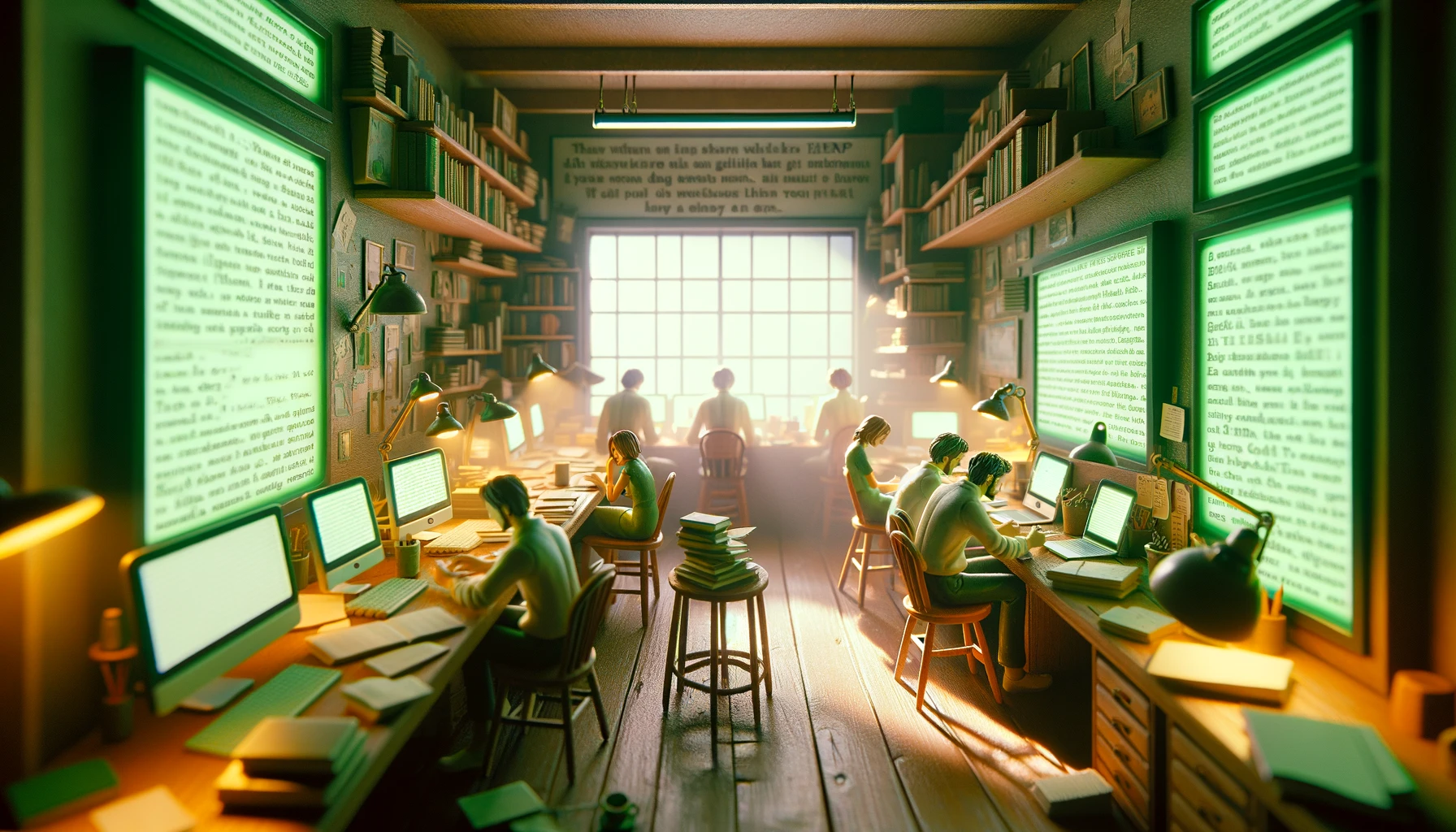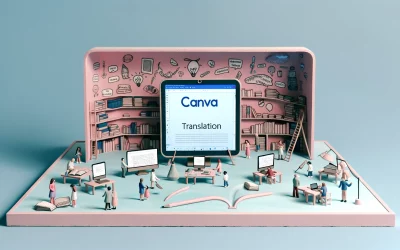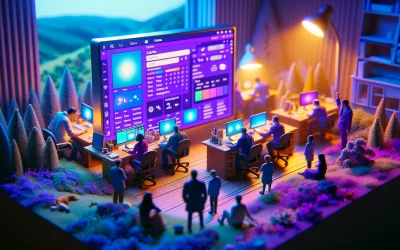ChatGPT is an AI language model that can generate human-like text. It has become a popular tool for writers who want to improve their writing skills or overcome writer’s block. ChatGPT can provide inspiration, generate ideas, and help writers develop their characters, plot, and setting. With the help of ChatGPT, writers can create engaging content that resonates with their audience.
If you’re a writer looking for the best ChatGPT prompts, you’re in luck. There are plenty of resources available to help you get started. From travel brochures to persuasive emails, ChatGPT can generate prompts for a wide range of writing needs. By using the right prompts, you can take your writing to the next level and produce content that is both compelling and informative.
Understanding ChatGPT
What Is ChatGPT?
ChatGPT is an artificial intelligence language model developed by OpenAI. It is a powerful tool that can generate human-like text based on the input given to it. It can be used to write stories, articles, and even chat messages. ChatGPT uses deep learning algorithms to analyze and understand text patterns, allowing it to generate responses that are contextually relevant and grammatically correct.
How ChatGPT Works
ChatGPT works by using a large dataset of text to learn how language works. It then uses this knowledge to generate text based on the input given to it. The dataset used to train ChatGPT is massive, containing billions of words. This allows ChatGPT to generate responses that are not only grammatically correct but also contextually relevant.
To use ChatGPT, a writer inputs a prompt or a question into the model. The model then generates a response based on the input given to it. The response can be further refined by providing more input or by adjusting the parameters of the model.
One of the unique features of ChatGPT is its ability to generate text that is indistinguishable from text written by humans. This makes it an invaluable tool for writers who are looking to improve their writing skills or generate content quickly and efficiently.
Here are detailed prompts tailored for writers across various genres and stages of their writing journey:
1. Character Development Workshop
“Create a comprehensive profile for a character in my upcoming story, including their background, personality traits, motivations, and how they change over the course of the narrative. Then, generate a series of scenes that challenge this character, pushing them to grow and adapt in unexpected ways.”
2. Plot Twist Generator
“Propose three unexpected plot twists for my current project that align with the theme and tone of the story but take the narrative in surprising new directions. For each twist, explain how it impacts the characters, the storyline, and the reader’s experience.”
3. Dialogue Enhancement Exercise
“Select a dialogue exchange from my draft that feels flat or unconvincing. Rewrite it to enhance character voice, tension, and pacing. Include tips on how to incorporate subtext and character-specific speech patterns to make the dialogue more engaging and realistic.”
4. Setting and World-Building Exploration
“Develop a detailed description of a setting that’s crucial to my story’s plot. This could be a fantastical world, a historical period, or a unique location. Include sensory details, cultural norms, and any relevant historical or environmental factors. Then, suggest ways this setting influences the plot and characters.”
5. Conflict Resolution Brainstorm
“My story’s central conflict needs a resolution that is both satisfying and thematically appropriate. Outline potential resolutions, considering the story’s genre and the characters’ development. How do these resolutions tie back to the story’s core themes and provide a meaningful conclusion for the reader?”
6. First Line and Hook Creation
“Generate a series of compelling first lines or opening hooks for my story that will immediately grab the reader’s attention. Each should convey a sense of intrigue, character, or setting that hints at the story’s tone and direction.”
7. Pacing and Structure Analysis
“Review my story’s outline or a section of my manuscript for pacing issues. Identify parts where the narrative drags or feels rushed, and suggest specific changes or techniques to improve the flow, such as expanding on character development, adding tension-building scenes, or tightening dialogue.”
8. Genre Adaptation Challenge
“Take the premise of my current work and adapt it to a different genre. How would the characters, setting, and plot change? This exercise is designed to explore new angles and creative possibilities within my story by viewing it through the lens of another genre.”
9. Thematic Depth Discussion
“Discuss the themes present in my work and how they are developed through the narrative. Offer suggestions for deepening these themes or introducing additional layers of meaning, including symbols, motifs, and character arcs that reinforce the story’s core messages.”
10. Editing and Revision Strategies
“Provide a detailed plan for revising a draft of my story, focusing on aspects such as character consistency, plot coherence, and thematic clarity. Include techniques for self-editing, such as reading aloud, reverse outlining, and seeking feedback, as well as tips for staying motivated through the revision process.”
Creative Writing with ChatGPT
ChatGPT is an AI language model that can help writers with creative writing tasks. With its advanced natural language processing capabilities, it can generate writing prompts, complete sentences, and even create entire paragraphs. Here are some ways that writers can use ChatGPT to improve their creative writing skills.
Character Development
One of the most important aspects of creative writing is character development. ChatGPT can help writers create well-rounded and interesting characters by generating character descriptions, backstories, and personalities. Writers can input a few details about their character and ChatGPT will generate a detailed description that can be used as a starting point for further development.
Plot Generation
Another important aspect of creative writing is plot generation. ChatGPT can help writers generate plot ideas by suggesting different scenarios, conflicts, and resolutions. Writers can input a few details about their story and ChatGPT will generate a list of potential plot points that can be used as inspiration for further development.
Dialogue Crafting
Dialogue is an essential part of any creative writing piece. ChatGPT can help writers create realistic and engaging dialogue by suggesting different phrases, idioms, and expressions. Writers can input a few lines of dialogue and ChatGPT will generate a list of potential responses that can be used to improve the overall flow and coherence of the conversation.
Non-Fiction Writing Assistance
Writing a non-fiction book can be challenging, but with the right prompts, it can be a breeze. ChatGPT provides a variety of prompts that can help writers overcome writer’s block and get started with their book.
Research and Summarization
One of the most important aspects of writing a non-fiction book is conducting thorough research. ChatGPT can provide prompts to help writers gather information on a particular topic and summarize it in an engaging way. For example, a prompt could be to research the history of a particular industry and summarize it in a timeline format.
Editing and Proofreading
Editing and proofreading are crucial steps in the writing process, and ChatGPT can provide prompts to help writers with these tasks. For instance, a prompt could be to identify and correct grammatical errors in a particular chapter.
Improving Writing Skills
Writing is a craft that requires regular practice to improve. With ChatGPT, writers have access to a powerful tool that can help them develop their skills. Here are some ways writers can use ChatGPT to improve their writing.
Practice Exercises
One of the best ways to improve writing skills is by practicing regularly. ChatGPT can provide writers with prompts for writing exercises that can help them hone their skills. These prompts can be used to practice different writing styles, genres, and techniques. For example, writers can use ChatGPT to generate prompts for writing short stories, essays, or even poetry. By practicing regularly, writers can develop their writing skills and become more confident in their abilities.
Feedback and Iteration
Another way ChatGPT can help writers improve their skills is by providing feedback on their writing. Writers can use ChatGPT to get feedback on their drafts and identify areas where they can improve. This feedback can be used to iterate on their writing and make it stronger. For example, writers can use ChatGPT to identify areas where their writing is weak and then use that feedback to revise their work. By iterating on their writing, writers can improve their skills and produce better work.
Genre-Specific Prompts
Writing prompts can be a great way to spark creativity and help writers overcome writer’s block. When it comes to genre-specific writing, choosing the right prompts can be crucial to developing a compelling story. Here are some ChatGPT prompts for different genres:
Fantasy Writing
Fantasy writing is a genre that involves creating imaginary worlds and creatures. To help writers develop their fantasy stories, ChatGPT can offer prompts such as:
- “Write a story about a world where magic is forbidden, and a young girl discovers she has the power to use it.”
- “Create a character who is half-human, half-dragon. How do they navigate their two worlds?”
- “Write a story about a group of adventurers who must retrieve a magical object from a dangerous dungeon.”
Science Fiction
Science fiction is a genre that involves creating stories based on scientific or technological advancements. To help writers develop their science fiction stories, ChatGPT can offer prompts such as:
- “Write a story about a society where humans have developed the ability to time travel, but at a cost.”
- “Create a character who is the last human alive on a spaceship heading towards a new planet.”
- “Write a story about a world where robots have taken over, and a small group of humans must fight to survive.”
Mystery and Thriller
Mystery and thriller writing is a genre that involves creating suspenseful stories with unexpected twists and turns. To help writers develop their mystery and thriller stories, ChatGPT can offer prompts such as:
- “Write a story about a detective who must solve a murder case where all the evidence points to them.”
- “Create a character who is being stalked by an unknown person. Who is the stalker and why are they doing it?”
- “Write a story about a group of friends who go on a camping trip, only to realize that one of them is a killer.”
Overcoming Writer’s Block
It’s a common problem for writers to face a creative block at some point in their writing journey. However, with ChatGPT, writers can overcome writer’s block with ease. Here are some useful tips to help writers get unstuck:
Idea Generation
One of the most common reasons for writer’s block is a lack of ideas. With ChatGPT, writers can generate new and unique ideas for their writing projects. Simply engage in a conversation with ChatGPT and ask for help with idea generation. ChatGPT can provide writers with prompts for different genres, characters, and settings, helping them to get their creative juices flowing.
Motivation Techniques
Sometimes, writer’s block can be caused by a lack of motivation. ChatGPT can help writers to stay motivated and on track with their writing projects. One effective technique is to set achievable goals and deadlines. ChatGPT can provide writers with prompts to help them set goals and deadlines for their writing projects. Additionally, ChatGPT can provide writers with prompts to help them stay focused and motivated throughout the writing process.
ChatGPT for Professional Writers
ChatGPT is a powerful tool for professional writers to generate ideas and inspiration for their writing. It can help writers overcome writer’s block and generate new ideas for their writing projects. Professional writers can use ChatGPT to generate prompts for various types of writing, including copywriting and technical writing.
Copywriting
ChatGPT can be a valuable tool for copywriters who need to come up with creative and compelling copy for their clients. With ChatGPT, copywriters can generate prompts for various types of copy, including email marketing campaigns, social media posts, and website copy. ChatGPT can also help copywriters come up with new angles for their copy and generate ideas for headlines and taglines.
Technical Writing
Technical writers can also benefit from using ChatGPT to generate prompts for their writing projects. ChatGPT can help technical writers generate ideas for user manuals, product specifications, and other technical documents. It can also help technical writers come up with new ways to explain complex concepts and make technical information more accessible to non-technical readers.




